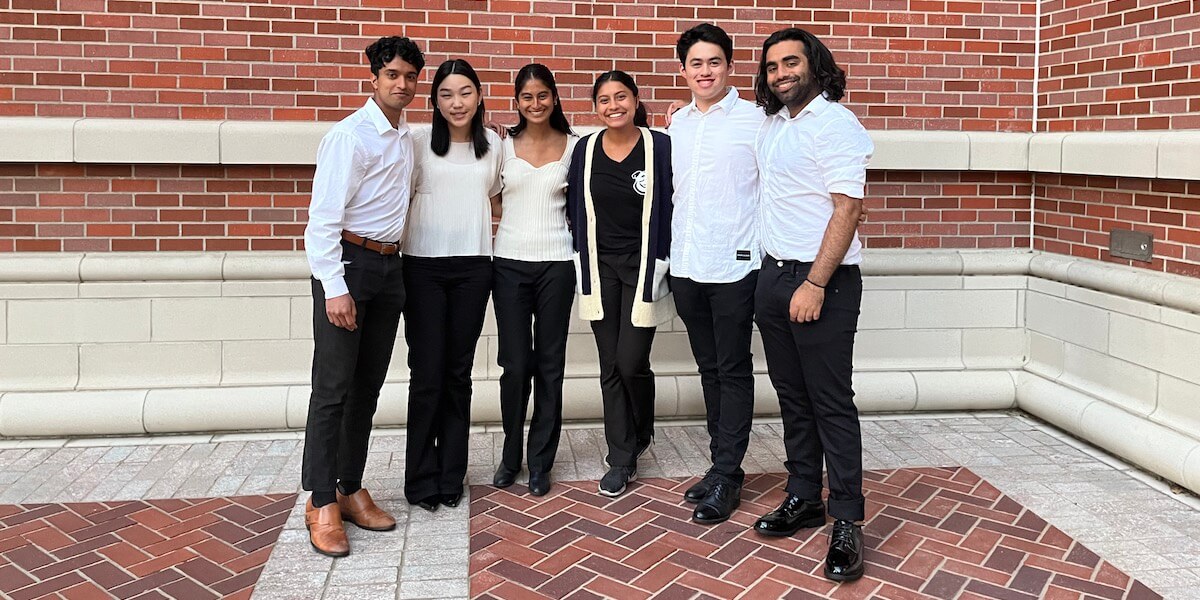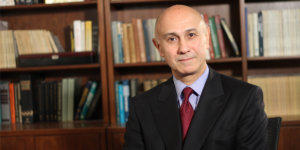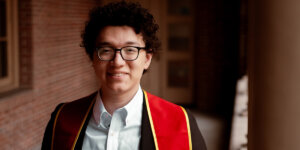
(Left to right) Members of Remedy: Rohan Jeni Varghese, Hannah Lee, Isha Sanghvi, Vivianna Camarillo, Jake Futterman and Ashwan Kadam (Photo/Courtesy of Hannah Lee)
Thieves often target vulnerable unhoused people, stealing their potentially lifesaving medications and selling them on the streets for illicit gain.
Hannah Lee and Isha Sanghvi believe their team of young business-builders have come up with a way to keep prescribed drugs out of the hands of malefactors and, in the process, protect the health of many houseless people with chronic health conditions.
Lee, a USC junior majoring in human biology, Sanghvi, a USC junior majoring in neuroscience, and seven members of Remedy, have developed a temperature-controlled wearable in which the unhoused can discreetly place their medicines and keep them away from thieves.
As an added bonus, Lee added, unhoused people could also put their drugs in a soft, flexible pill container developed by Remedy that fits comfortably against their bodies, even when sleeping.
That vision landed Remedy the $50,000 grand prize at the 2022 Min Family Challenge, an engineering social entrepreneurship competition that encourages would-be social entrepreneurs to build companies to benefit the underprivileged locally, nationally, and even worldwide. The contest kicked off in December with the finals taking place in-person and remotely on Tuesday, May 3.
“MFC was incredibly helpful,” said Lee, adding that she and her teammates expect to continue with Remedy. “It forced us to take a step back away from the day-to-day aspects and focus on the entire business.”
USC Viterbi Dean Yannis C. Yortsos said MFC empowers USC Viterbi students and other contest participants to address “wicked problems at the intersection of societal grand challenges and technology.”
Added Trina Gregory, MFC co-director and associate director of the Office of Technology Innovation and Entrepreneurship, or TIE: “These students are using engineering for social impact. They want to make a difference.”
“Remembering those who are forgotten”
MFC launched in October 2015 with a generous gift from Bryan Min, B.S. ISE ’86 and a member of the USC Viterbi Board of Councilors, and his family: his wife Julie Min; their son Brandon, a USC Viterbi graduate in industrial systems engineering; and daughter Brittany, also a USC graduate.
At the contest, Bryan Min said that his family has “witnessed the fruition of MFC over the years and [applaud] its vision of improving lives.”
Julie Min echoed her husband’s sentiments: “These MFC students are brilliant, the top echelon of the world, and they’re remembering those who are forgotten.”
The other 2022 MFC finalists included:
Chimney Cherry: A renewable powered retrofit device that combats residential wood-burning pollution
Equilateral: Creating the next-gen AI to build affordable, elegant custom apps
MicroMaterna: Reducing preventable childbirth-related deaths through the improved diagnosis of preeclampsia in low-resource setting
SABA: A digital platform for sustainable fashion
SustainG: A B2C platform that provides mobile app with an IoT platform with open-source APIs that simplify energy-saving for students residing in university housing units.
David Gerber, MFC co-director and TIE associate director, said MFC plays an important role in fostering innovation at USC.
“MFC is a huge opportunity for students to not only compete for a cash prize but to get a huge amount of coaching and exposure to accelerate an idea into a full-fledged business that has social impact in its core mission,” he said.
As in the past couple of challenges, this year’s MFC theme was inspired by the 2030 Agenda for Sustainable Development, a universal call to action to end poverty, protect the planet and improve the lives of people everywhere.
Participants in this year’s MFC attended workshops developed by TIE and the Innovation Node-Los Angeles that focused on customer discovery, storytelling, law, and business modeling.
Nick Enriquez, a junior studying biomedical engineering and cofounder of MicroMaterna, said he found the sessions valuable. “I really like the guidance, structure and resources to turn an idea into a product.”
MFC participants also benefited from working with volunteer mentors, who helped them hone their ideas and develop business strategies.
Daniel Druhora, a lecturer and director of new initiatives at USC Viterbi, served as a mentor for Chimney Cherry. He taught team members the importance of hearing directly from potential customers in a niche market.
“Understanding how to turn user stories into meaningful data is what transforms ideas into products,” Druhora said. “A lot of entrepreneurship is about mastering the art of listening, especially in a specialized market like wood burners in Alaska. The team had to listen to people’s pain points first before going to the ideation phase.”
Brad Cracchiola, a USC Viterbi adjunct faculty member and an associate director at Designworks, a global design consulting firm owned by BMW, served as a mentor for Remedy and Chimney Cherry. Cracchiola, B.S. AME ’88 and M.S. MECH ’93, said he offered MFC participants “a real-world industry perspective.”
TIE Vice Dean Ellis Meng said MFC gives budding entrepreneurs the skillset to “decide what the problems are and come up with ways of solving them.”
MFC constantly evolving
MFC has consistently evolved over the years.
In 2018, MFC took USC Viterbi and other students to Texas to meet with Hurricane Harvey survivors. Participants focused on developing sustainable ventures to enhance relief and recovery efforts for victims of that and other natural disasters.
In 2019, the challenge focused on the world’s growing refugee crisis. As part of a special class, CE 499: Engineering Innovation for Global Challenges, students went to Lesvos, Greece, to meet with refugees and devise innovative solutions to meet the needs of people in crisis.
Last year’s winner, Social Benefit, aims to help end cyclical homelessness and poverty by creating a digital platform that brings transparency to government benefits for low-income populations and their case managers.
Gerber, the MFC codirector, said the challenge empowers aspiring entrepreneurs to make a difference. “We’re helping young people achieve their own personal mission of helping society,” he said.
Published on May 10th, 2022
Last updated on May 16th, 2023










